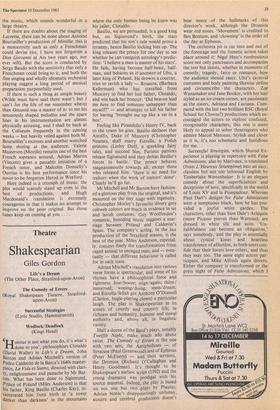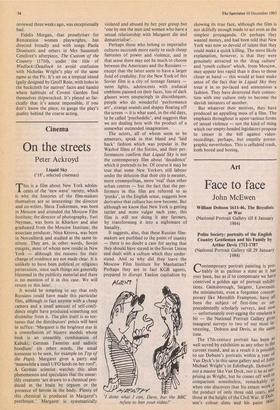Theatre
Shakespearian
Giles Gordon
Life's a Dream (The Other Place, Stratford-upon-Avon) The Comedy of Errors (Royal Shakespeare Theatre, Stratford- upon-Avon) Successful Strategies (Lyric Studio, Hammersmith) Wedlock/Deadlock (Kings Head)
'Honour is not what you do, it's what's done to you', philosophises Clotaldo (David Waller) in Life's a Dream, John Barton and Adrian Mitchell's version of Pedro Calder& de la Barca's 1640s master- Piece, La Vida es Sueno, directed with clari- ty, enlightenment and panache by Mr Bar- ton. What has been done to Sigismund, Prince of Poland (Miles Anderson) is that his father, King Basilio (Charles Kay), in- carcerated him from birth in 'a tower darker than darkness' in the mountains
where the only human being he knew was his jailer, Clotaldo.
Basilio, we are persuaded, is a good king but, on Sigismund's birth, the stars predicted that his son's rule would prove a tyranny, hence Basilio locking him up. The king releases the prince for one day to see whether he can vanquish astrology's predic- tion: 'I believe a man is master of his stars'. He fails, having become half-beast, half- man, and behaves as if ancestor of Ubu, a
later king of Poland. He drowns a courtier, tries to ravish a lady — Rosaura, (Barbara Kellerman) who has travelled from Muscovy to find her lost father, Clotaldo, and win back her honour: 'Did heaven lead me here to find someone unhappier than myself?' — and attempts to kill his father for having 'brought me up like a rat in a box'.
Feeling like Pirandello's Henry IV, back to the tower he goes. Basilio declares that Astolfo, Duke of Muscovy (Christopher Neame), shall marry Estrella, a Polish princess (Lesley Duff, a sparkling fairy tale), and succeed him. Furious patriots release Sigismund and they defeat Basilio's forces in battle. The prince behaves magnanimously towards all, except those who released him: 'there is no need for traitors when the work of traitors' done'. Clearly he'll go far.
Mr Mitchell and Mr Barton have fashion- ed a glorious play from the original, and it's mounted on the tiny stage with ingenuity. Christopher Morley's favourite silvery grey cobweb colours are much in evidence in set and lavish costumes. Guy Woolfenden's romantic, brooding music suggests a mar- riage between Poland and Calderon's Spain. The company's acting, in the last production of the Stratford season, is the best of the year. Miles Anderson, especial- ly, conveys finely the transformation from caged animal to uncaged man, and — even- tually — that different behaviour is called for in each state.
Adrian Mitchell's translation into various verse forms is spectacular, and some of his rhymes have a philosophical force and rightness: lose/booze; reign/again; thirst/ immersed; wooing/doing; seem/dream; and Estrella/fellah got Anthony O'Donnell (Clarion, bugle-playing clown) a particular laugh. The play is Shakespearian in its scenes of courtly and country life, in richness and humanity, humour and moral authority and, above all, in linguistic variety.
Half a dozen of the Bard's plays, notably Twelfth Night, make much ado about twins. The Comedy of Errors is the one with two sets, the Antipholuses — of Syracuse (Paul Greenwood) and of Ephesus (Peter McEnery) — and their servants, the Dromios (Richard O'Callaghan and Henry Goodman). It's thought to be Shakespeare's earliest script (1592) and the young dramatist was prodigal with his source material. Indeed, the play is based on not one but two plays by Plautus. Adrian Noble's disappointingly unfunny, austere and cerebral production doesn't bear many of the hallmarks of this director's work, although the Dromios wear red noses. 'Movement' is credited to Ben Benison, and 'clowning' is the order of the day at Ephesus.
The orchestra pit is cut into and out of the forestage and the frenetic action takes place around it: Nigel Hess's rumbustious score not only punctuates and accompanies the text but insists, whether in moments of comedy, tragedy, farce or romance, how the audience should react. Ultz's carnival costumes and body painting likewise define and circumscribe the characters. zoe Wanamaker and Jane Booker, with her hair styled as an ice cream cornet, are passionate as the sisters, Adriana and Luciana. Com- pared with the last two brilliant RSC (Royal School for Clowns?) productions which en- couraged the actors to explore confused, recognisable characters, this one is more likely to appeal to sober theatregoers who admire Marcel Marceau. Stylish and clever as it is, it's too schematic and fastidious for me.
Successful Strategies, which Shared Ex- perience is playing in repertoire with False Admissions, also by Marivaux, is translated (from Llieureux Strategeme) into an easy, classless but not too informal English by Timberlake Wertenbaker. It is an elegant comedy about the superficialities and deceptions of love, specifically in the world of Louis XV and la Pompadour. Whereas Paul Dart's designs for False Admissions were a sumptuous black, here he has pro- vided a joyful white garden. The characters, other than Sam Dale's Arlequin ' (more Picasso pierrot than Watteau), are dressed in white silk and satin. 'Un- faithfulness can become an obligation,' says somebody, and the play is essentially about cynical kisses and heartless transference of affection, as both sexes con- fide that their lovers love others, and thus they may too. The same eight actors par- ticipate, and Mike Alfreds again directs. Either the company is transformed or the press night of False Admissions, which I
reviewed three weeks ago, was exceptionally bad.
Fidelis Morgan, that proselytiser for Restoration women playwrights, has directed broadly and with songs Paola Dionisotti and others in Mrs Susannah Centlivre's afterpiece, The Custom of the Country (1710), under the title of Wedlock/Deadlock to avoid confusion with Nicholas Wright's play of the same name at the Pit. It's set on a tropical island (gaily designed by Geoff Rose, with holes in the backcloth for natives' faces and hands) where habitues of Covent Garden find themselves shipwrecked. It's played so far- cically that it's amost impossible, if you don't know the piece, to gauge the play's quality behind the coarse acting.















































 Previous page
Previous page